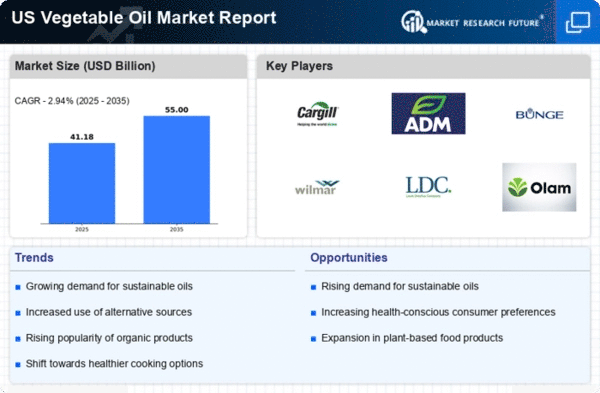Growing Export Opportunities
the vegetable oil market benefits from expanding export opportunities, particularly as international demand for US-produced oils rises.. Countries in Asia and Europe are increasingly importing vegetable oils from the US, driven by the need for high-quality products. In 2025, US vegetable oil exports are anticipated to reach approximately $5 billion, reflecting a robust growth trajectory. This trend is fueled by the reputation of US oils for their quality and safety standards. As global markets continue to evolve, the vegetable oil market is likely to capitalize on these opportunities, enhancing its position in the international trade landscape.
Increased Use in Food Processing
The vegetable oil market is witnessing a surge in demand due to its extensive use in food processing applications. Oils are essential ingredients in various food products, including baked goods, snacks, and sauces. In the US, the food processing sector is projected to grow at a CAGR of 3% over the next few years, which will likely drive the demand for vegetable oils. As manufacturers seek to enhance flavor, texture, and shelf life, the reliance on vegetable oils is expected to increase. This trend underscores the importance of the vegetable oil market in supporting the food industry, as it plays a crucial role in meeting consumer expectations for quality and taste.
Rising Demand for Plant-Based Oils
The vegetable oil market is experiencing a notable increase in demand for plant-based oils, driven by a growing consumer preference for healthier and more sustainable food options. In the US, the market for plant-based oils is projected to reach approximately $20 billion by 2026, reflecting a compound annual growth rate (CAGR) of around 5%. This shift is largely influenced by the rising awareness of the health benefits associated with oils such as olive, canola, and sunflower. As consumers become more health-conscious, they are increasingly opting for oils that are lower in saturated fats and higher in unsaturated fats. This trend is expected to continue, propelling the vegetable oil market forward as manufacturers adapt their product lines to meet evolving consumer preferences.
Regulatory Support for Sustainable Practices
The vegetable oil market is influenced by regulatory frameworks that promote sustainable agricultural practices. In the US, government initiatives aimed at supporting environmentally friendly farming methods are gaining traction. These regulations encourage the adoption of practices that reduce the environmental impact of oil production, such as crop rotation and integrated pest management. As sustainability becomes a priority for consumers and businesses alike, the vegetable oil market is expected to benefit from these regulatory measures. This support not only enhances the market's reputation but also aligns with the growing consumer demand for responsibly sourced products.
Technological Advancements in Oil Extraction
Technological innovations in oil extraction processes are significantly impacting the vegetable oil market. Advanced extraction techniques, such as cold pressing and supercritical fluid extraction, enhance oil yield and preserve nutritional quality. These methods not only improve efficiency but also reduce production costs, making it more feasible for producers to meet the growing demand. In the US, the adoption of these technologies is likely to increase, as companies seek to optimize their operations and maintain competitive pricing. Furthermore, the integration of automation and data analytics in production processes is expected to streamline operations, thereby contributing to the overall growth of the vegetable oil market.
















